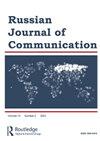反改革时代的俄罗斯知识分子*
Q1 Social Sciences
引用次数: 1
摘要
公元前57年,罗马执政官、著名公共知识分子马库斯·图利乌斯·西塞罗(Marcus Tullius Cicero)遭遇了严重的政治逆风。在拒绝恺撒的邀请加入反共和军后,他被流放,在那里他沉思着他对自己、家庭和国家的责任。在给他的朋友阿提克斯的一封信中,西塞罗概述了当共和国的命运悬而未决时,忠诚的公民所面临的严峻的道德选择。问题是本文章由计算机程序翻译,如有差异,请以英文原文为准。
Russian intelligentsia in the age of counterperestroika*
In 57 B.C.E., Marcus Tullius Cicero, a Roman consul and leading public intellectual, ran into heavy political headwinds. After turning down Caesar’s invitation to join the antirepublican forces, he was driven into exile where he brooded about the duty he owed to himself, his family and his country. In a letter to his friend Atticus, Cicero outlined the stark moral choices committed citizens face when the fate of the republic hangs in the balance. The question is
求助全文
通过发布文献求助,成功后即可免费获取论文全文。
去求助
来源期刊

Russian Journal of Communication
Social Sciences-Political Science and International Relations
自引率
0.00%
发文量
0
期刊介绍:
Russian Journal of Communication (RJC) is an international peer-reviewed academic publication devoted to studies of communication in, with, and about Russia and Russian-speaking communities around the world. RJC welcomes both humanistic and social scientific scholarly approaches to communication, which is broadly construed to include mediated information as well as face-to-face interactions. RJC seeks papers and book reviews on topics including philosophy of communication, traditional and new media, film, literature, rhetoric, journalism, information-communication technologies, cultural practices, organizational and group dynamics, interpersonal communication, communication in instructional contexts, advertising, public relations, political campaigns, legal proceedings, environmental and health matters, and communication policy.
 求助内容:
求助内容: 应助结果提醒方式:
应助结果提醒方式:


